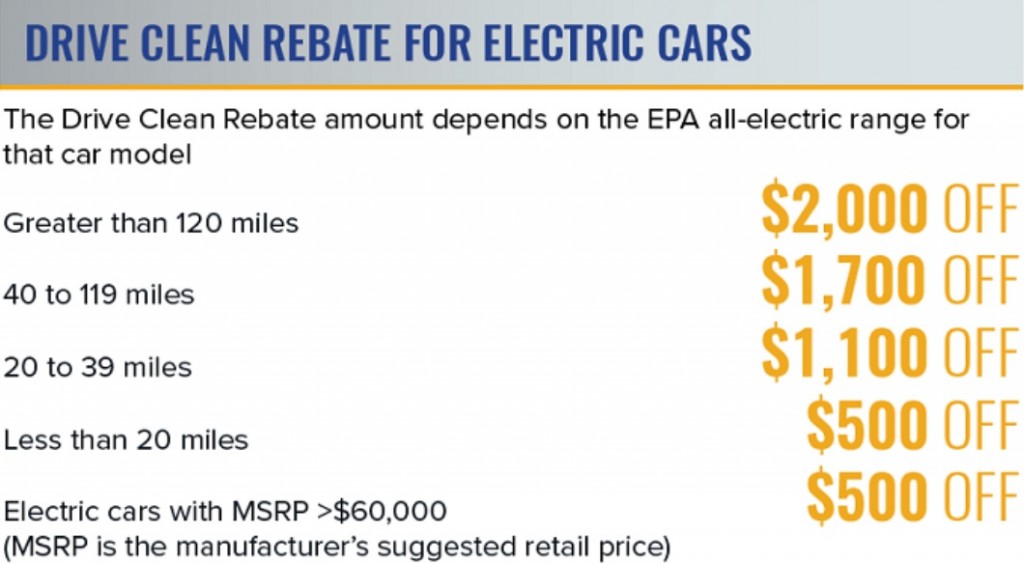New York State is known for a lack of transparency, backroom dealings, and little public input into the deliberations that lead to legislation produced by its state legislature.
So it wasn't too surprising that after Governor Andrew Cuomo announced an electric-car incentive program in April 2016, radio silence ensued.
Thankfully, the legislation as published contained an effective date of April 1 this year.
DON'T MISS: New York state electric-car rebate program to launch this month
Now, just under the wire, we have the details on the new Drive Clean rebates, rolled out on Tuesday by the Cuomo administration.
The most interesting part may be the way it's structured to encourage the purchase of mass-priced battery-electric and plug-in hybrid vehicles.
New York now has roughly 16,000 plug-in hybrids and battery-electric vehicles on the state's roads.

New York state 'Drive Clean' electric-car rebate program amounts, March 2017
But two years ago, before a surge of plug-in hybrid Ford Fusion Energi and C-Max Energi models hit state roads, those electric cars skewed toward one model: the Tesla Model S.
The battery-electric luxury sedan on sale since 2012 and popular with Wall Street financiers, among many other buyer groups, largely centered around New York City. The Model S now starts at $75,000.
In the chart above, notice that the rebate for qualifying cars with recommended sticker prices above $60,000 falls from $2,000 to $500.
CHECK OUT: Which Electric Car Dominates Sales In New York State? (May 2015)
The upcoming Tesla Model 3, however, is said to start at $35,000 and offer 215 miles of range or more, so much of its lineup will likely qualify for New York's rebate—as will the current Chevrolet Bolt EV and the upcoming second-generation Nissan Leaf.
Concern over public perceptions that an inordinate number of California's state rebates for zero-emission vehicles were going to wealthy Tesla owners recently led that state to restructure its incentive program.
While purchase price would undoubtedly have been a simpler way to bracket the amounts rebated, the Golden State chose to vary its clean-car rebate based on the buyer's income. Let's just say that one's complicated.

2012 Tesla Model S, brief test drive, New York City, July 2012
New York state's new incentive also encourages the purchase of longer-range electric vehicles under that price cap, based on their EPA-rated electric range. (The federal income-tax credit is based on battery-pack capacity, but this is a more consumer-friendly approach.)
A car with less than 20 miles gets $500; 20 to 39 miles gets $1,100; the amount rises to $1,700 if the range is 40 to 119 miles; and the full $2,000 goes only to cars with 120 miles of range or more.
Rebates for cars with 20 or more miles of rated range, of course, require the MSRP to be $60,000 or less.
READ THIS: New York adds electric-car purchase incentives, Minnesota may follow (Apr 2016)
Rebates are also nominally available for hydrogen fuel-cell vehicles, although no such cars are sold in New York state at this time.
An additional $15 million will support improving consumer awareness of electric vehicles and their many benefits, installing more charging stations and other efforts to put more clean vehicles on New York’s roadways.
The state is working to install charging infrastructure to accommodate more than 30,000 plug-in electric vehicles by 2018 and 1 million by 2025.

Reception at Tesla Store in New York Ciy following cross-country road trip in Model S electric cars
Also, in the fall of 2016, the state's Environmental Protection Fund said it would provide up to $3 million for municipalities to purchase or lease zero-emission vehicles for their fleets.
New York state's Drive Clean program, approved as part of the state's 2016-2017 budget, will be administered by the California-based Center for Sustainable Energy.
It's the fourth such state-incentive program the Center manages; the others are in California itself, Connecticut, and Massachusetts.
_______________________________________













